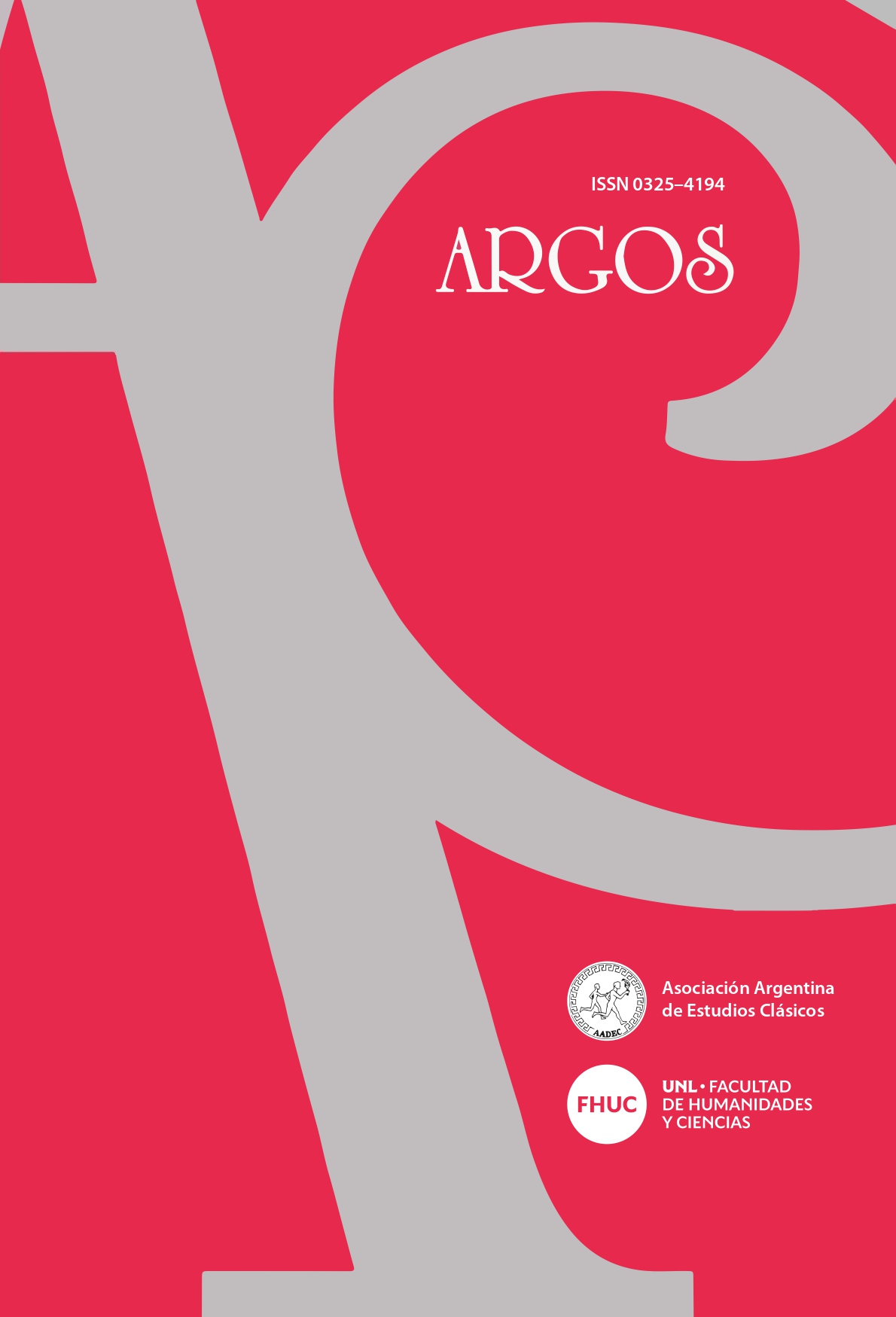Identidad(es) en Argonáuticas de Apolonio de Rodas: esbozos de un comportamiento argonáutico
DOI:
https://doi.org/10.14409/argos.2023.49.e0050Palavras-chave:
Apolonio de Rodas, Argonáutica, identidad, Idas, AnceoResumo
Los héroes que participan de la célebre convocatoria de Jasón para ir a la Cólquide en busca del vellocino de oro son precedidos por una reconocida identidad individual que coexiste, mientras dura la expedición, con la identificación colectiva argonáutica. La caracterización Minia que se despliega a lo largo de la epopeya propone mantener la concordia (ὁμόνοια) y solidaridad entre los compañeros y rechazar la ira (μῆνις) y la soberbia, inter alia. Sin embargo, Idas y Anceo, dos participantes de la empresa, son presentados en el catálogo como soberbios (ὑπέρβιος). Mi objetivo en este artículo consiste en analizar cómo se define la identidad argonáutica y de qué manera se resuelve la tensión entre la identificación singular de Idas y Anceo con las cualidades grupales establecidas.
Referências
Bibliografía
Ediciones
ARDIZZONI, A. (1967). Apollonio Rodio Le Argonautiche. Libro I. Testo, traduzione e commentario a cura di Anthos Ardizzoni. Edizione Dell´Ateneo.
BYWATER, I. (2010 [1890]). Aristotelis Ethica Nicomachea. Cambridge University Press.
FRÄNKEL, H. (1961). Apollonii Rhodii Argonautica. Oxford University Press.
GREEN, P. (2007 [1997]). The Argonautika by Apollonios Rhodios. Translated with Introduction, Commentary and Glossary by Peter Green. University of California Press.
HUNTER, R. L. (1998[1989]). Apollonius of Rhodes Argonautica, Book III. Cambridge University Press.
MATTEO, R. (2007). Apollonio Rodio Argonautiche. Libro II. Introduzione e commento a cura di Rocchina Matteo. Edizioni Pensa Multimedia.
PADUANO, G. & FUSILLO, M. (2016 [1986]). Apollonio Rodio Argonautiche, introduzione e commento. Rizzoli Libri.
VIAN, F. (2009 [1974]). Apollonios de Rhodes, Argonautiques. Chants I-II. Les Belles Lettres.
VIAN, F. (2017 [1980]). Apollonios de Rhodes, Argonautiques. Chant III. Les Belles Lettres.
WEST, M. L. (2000). Homeri Ilias. vol. II, XIII-XIV, K. G. Saur Verlag.
WEST, M. L. (2006). Homeri Ilias. vol. I, I-XII, K. G. Saur Verlag.
WEST, M. L. (2017). Homerus Odyssea. De Gruyter.
Estudios
BENWELL, B. & STOKOE, E. (2006). Discourse and Identity. Edinburgh University Press.
BURGESS, S. (2020). Apollonius of Rhodes and Homeric Anger. https://classical-inquiries.chs.harvard.edu/apollonius-of-rhodes-and-homeric-anger/
BURKERT, W. (2007 [1977]). Religión griega arcaica y clásica. Abada Editores.
DEMETRIOU, D. (2012). Negotiating Identity in the Ancient Mediterranean. The Archaic and Classical Greek Multiethnic Emporia. Cambridge University Press.
DOMINGO GYGAX, M. (2016). Benefaction and Rewards in the Ancient Greek City. Cambridge University Press.
EISENSTADT, S. N. & GIESEN, B. (1995). “The Construction of Collective Identity”. European Journal of Sociology 36 (1), pp. 72-102.
JACKSON, S. (1997). Argo: The First Ship? Rheinisches Museum für Philologie. Neue Folge, 140. Bd., H. 3/4, pp. 249-257.
JENKINS, R. (2004). Social Identity. Routledge.
HARDER, A. (2019). Sons and fathers in the catalogue of Argonauts in Apollonius Argonautica 1.23-233, EuGeStA 9, pp. 1-25.
HUNTER, R. (1993.) The Argonautica of Apollonius. Cambridge University Press.
KONSTAN, D. (2001). To Hellēnikon ethnos: Ethnicity and the Construction of Ancient Greek Identity, en MALKIN, I. (Ed.) Ancient Perceptions of Greek Ethnicity, pp. 29-50. Harvard University Press.
KONSTAN, D. (2006). The Emotions of the Ancient Greeks. Studies in Aristotle and Classical Literature. University of Toronto Press.
KYRIAKOU, P. (1994). Empedoclean Echoes in Apollonius Rhodius' 'Argonautica'. Hermes 122, pp. 309-319.
LAWALL, G. (1966). Apollonius’ Argonautica: Jason as Antihero. YCIS 19, pp. 119-169.
MAIRS, R. (2013). The Hellenistic Far East: From the Oikoumene to the Community, en STAVRIANOPOULOU, E. (Ed.) Shifting Social Imaginaries in the Hellenistic Period Narrations, Practices, and Images. Brill, pp. 365-385.
MORENO LEONI, A. M. (2018). El primer hombre que reunió todo el Peloponeso en la llamada Confederación Aquea. El territorio y sus discursos entre la élite política aquea de los siglos iii-ii a. C., en DELL’ELICINE, E.; FRANCISCO, H.; MICELI, P.; MORIN, A. (Comp.) Prácticas estatales y regímenes de territorialidad en las sociedades premodernas, pp. 49-75. Ediciones UNGS.
MORI, A. (2005). Jason's Reconciliation with Telamon: A Moral Exemplar in Apollonius' ‘Argonautica’ (1.1286-1344). The American Journal of Philology 126 (2), pp. 209-236.
MORI, A. (2008). The Politics of Apollonius Rhodius’ Argonautica. Cambridge University Press.
MORRISON, A. D. (2007). The Narrator in Archaic Greek and Hellenistic Poetry. Cambridge University Press.
MUELLNER, L. (1996). The Anger of Achilles. Menis in Greek Epic. Cornell University Press.
NISHIMURA-JENSEN, J. (2009). The Chorus of Argonauts in Apollonius of Rhodes' Argonautica, Phoenix 63 (1/2), pp. 1-23.
PATTERSON, L. E. (2010). Kinship Myth in Ancient Greece. University of Texas Press.
PLÁCIDO, D. (2017). La crisis de la ciudad clásica y el nacimiento del mundo helenístico. Miño y Dávila Editores.
ROMNEY, J. M. (2020). Lyric Poetry and Social Identity in Archaic Greece. University of Michigan Press.
STEPHENS, S. A. (2003). Seeing Double. Intercultural Poetics in Ptolemaic Alexandria. University of California Press.
THALMANN, W. G. (2011). Apollonius of Rhodes and the Spaces of Hellenism. Oxford University Press.
THERIAULT, G. (1996). Le culte d’’Homonoia dans les cités grecques. Éditions du Sphinx et Maison de l'Orient Méditerranéen.
VOLONAKI, E. (2013). The Art of Persuasion in Jason’s Speeches: Apollonius of Rhodes, Argonautica, en KREMMYDAS, C.; TEMPEST, K. (Eds.). Hellenistic Oratory. Continuity and Change, pp. 51-70. Oxford University Press.
Instrumenta
CHANTRAINE, P. (1999 [1968]). Dictionnaire étymologique de la langue grecque. Histoire des mots. Klincksieck.
DIGGLE, J.; FRASER, B. L.; JAMES, P.; SIMKIN, O. B.; THOMPSON, A. A.; WESTRIPP, S. J. (2021). The Cambridge Greek Lexicon, Volume I. A-I. Cambridge University Press.
DIGGLE, J.; FRASER, B. L.; JAMES, P.; SIMKIN, O. B.; THOMPSON, A. A.; WESTRIPP, S. J. (2021). The Cambridge Greek Lexicon, Volume II. K-Ω. Cambridge University Press.
HUMBERT, J. (1960 [1945]). Syntaxe grecque. Klicksieck.
LIDDELL, H. G.; SCOTT, R.; JONES, H. S. & MCKENZIE, R. (1996 [1843]). A Greek-English Lexicon. Clarendon Press.
SMYTH, H. W. (1920). A Greek Grammar for Colleges. American Book Company.
VAN EMDE BOAS, E.; RIJKSBARON, A.; HUITINK, L; DE BAKKER, M. (2019). Cambridge Grammar of Classical Greek. Cambridge University Press.
Downloads
Publicado
Como Citar
Edição
Seção
Licença
Copyright (c) 2024 Argos

Este trabalho está licenciado sob uma licença Creative Commons Attribution-NonCommercial-ShareAlike 4.0 International License.



